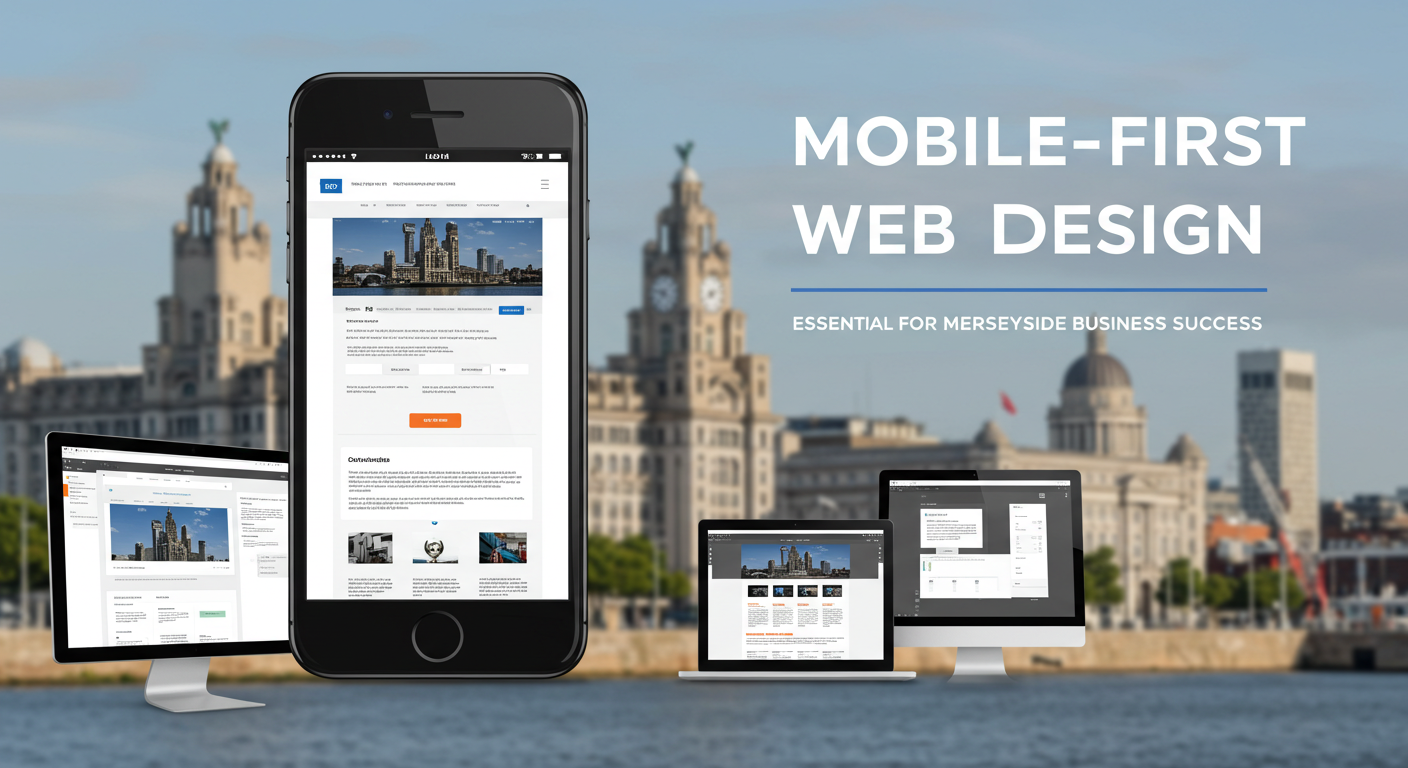SEO for Liverpool Businesses: The Only 5 Things That Actually Matter in 2025
Forget the jargon, the snake oil, and the £2,000-a-month retainers. Here’s what works (and what’s a complete waste of your money).
Let’s get something straight: SEO agencies love making this stuff sound complicated because complicated equals expensive. They’ll blind you with talk of “schema markup,” “canonical tags,” and “domain authority” – all while charging you four figures a month to do… what, exactly?
Here’s the truth we’ve learned building websites for Liverpool businesses over the past five years: 95% of local SEO comes down to just 5 things. Master these, and you’ll outrank half the businesses in Merseyside. Ignore them, and you’re invisible on Google – no matter how fancy your website looks.
We’re not saying SEO is simple. But we are saying it’s not the dark art agencies pretend it is. So let’s cut through the nonsense and focus on what actually moves the needle.

1. Google Business Profile: Your Secret Weapon (That You’re Probably Ignoring)
If you take nothing else from this article, take this: your Google Business Profile is worth more than your entire website for local SEO. Seriously.
Think about it. When someone searches “accountant near me” or “plumber Liverpool,” what shows up first? The map pack with three local businesses. That’s Google Business Profile. Not your website. Not your fancy SEO-optimized blog. Your GBP listing.
What Actually Works:
- Complete EVERY section – We’ve seen Liverpool businesses leave 60% of their profile blank. That’s like opening a shop and only stocking half the shelves.
- Post weekly updates – Special offers, new services, events. Google rewards active profiles.
- Respond to every review – Even the bad ones (especially the bad ones). Shows you’re engaged.
- Add photos regularly – Businesses with photos get 42% more direction requests. We didn’t make that stat up – Google did.
- Use the correct categories – Don’t be “Restaurant.” Be “Italian Restaurant” or “Gastropub.” Specificity wins.
We had a cafe client on Bold Street who wasn’t showing up for “coffee Bold Street Liverpool” – despite being, you know, on Bold Street. Turns out their GBP category was “Food & Drink” instead of “Coffee Shop.” Changed it, added weekly posts, and they jumped to position 2 in the map pack within three weeks.
Cost to fix this: £0. Time required: 2 hours to set up properly, then 15 minutes a week. Compare that to a £1,500/month SEO retainer.
2. Get Mentioned Where It Actually Matters
Here’s where most Liverpool businesses go wrong: they think “backlinks” means getting listed on every dodgy directory from here to Timbuktu. Nope.
Google cares about relevant, local, authoritative mentions. Not 500 links from random blog spam sites.
What Works for Liverpool Businesses:
- Liverpool Echo business directory – Local, trusted, Liverpool-specific. One link here beats 100 random directories.
- Liverpool Chamber of Commerce – If you’re not a member, you should be. Great for networking AND for the link.
- Industry directories that actually matter – Yell, Thomson Local, Yelp for restaurants, Houzz for tradespeople. Choose 5-10 relevant ones, not 500.
- Local sponsorships – Sponsor a local football team, charity event, or school fete. You get a link from their website AND community goodwill.
- Partnerships with other Liverpool businesses – Cross-promote. You’re a wedding photographer? Partner with local venues, caterers, florists. Everyone links to everyone.
We worked with a Liverpool plumber who was obsessed with getting thousands of directory listings. Spent £800 on a “link building package” that got him listed on 500 sites – 90% of which were irrelevant garbage. His ranking? Didn’t budge.
Then we got him featured in three places: Liverpool Echo business section, a local home improvement blog, and Checkatrade. Three links. Rankings doubled in 6 weeks.
🎯 Pro Tip: The “Digital PR” Hack
Want free press coverage? Create a local study or survey. “We surveyed 100 Liverpool restaurants about post-COVID challenges” or “We analyzed 500 Merseyside house prices.” Send it to Liverpool Echo, Radio City, local bloggers.
You’ll get links, mentions, and actual PR coverage. We’ve done this for clients – it works stupidly well. Cost: A few hours of your time. Value: Thousands in equivalent advertising.

3. Content That Answers Real Questions (Not “SEO Content”)
Right, this is where it gets controversial. Most “SEO content” is absolute rubbish. You know the type – 2,000-word articles that take 15 paragraphs to say something that could be said in two sentences.
Google’s smarter than that now. And your customers definitely are.
Write Content People Actually Want to Read:
Think about what your customers ask you all the time. Those questions? That’s your content.
- Electrician: “How much does rewiring a terraced house cost in Liverpool?” – Answer it honestly, with real prices.
- Solicitor: “How long does conveyancing take in Merseyside?” – Give them a straight answer, not legal waffle.
- Restaurant: “Best vegan options in Liverpool City Centre” – Show your menu, explain your approach, make it useful.
We made a mistake ourselves with our early blog posts. Wrote stuffy, “professional” SEO articles about “optimizing meta descriptions” and “canonical URLs.” Know who read them? Nobody. Literally nobody.
Then we started writing stuff like “Why Your Liverpool Restaurant Website Probably Sucks” and “5 Web Design Mistakes We’ve Made (So You Don’t Have To).” Honest, useful, bit cheeky. Traffic tripled. Enquiries quadrupled.
The Content Framework That Works:
- Answer the question in the first paragraph – Don’t make people scroll through your life story.
- Use real examples from your experience – Liverpool businesses, actual numbers, real scenarios.
- Be honest about pricing – Even ballpark figures. People appreciate transparency.
- Add outbound links to quality sources – Link to authoritative websites, studies, and resources. Google sees this as a trust signal that you’re providing genuine value, not just trying to trap people on your site.
- Make it scannable – Subheadings, bullet points, short paragraphs. This isn’t a novel.
- Update it regularly – Old content gets stale. Refresh it yearly.
4. Make Your Website Not Terrible (The Technical Stuff That Actually Matters)
Here’s where agencies love to overcomplicate things. They’ll audit your site and produce a 50-page report about “critical errors” that are, frankly, not that critical.
Reality check: You need to get 5 technical things right. Everything else is noise.
The Only Technical SEO Checklist You Need:
| Must-Have (Fix Now) | Why It Matters |
|---|---|
| Mobile-friendly design | 60% of searches are mobile. If your site’s rubbish on phones, you’re invisible. |
| Fast loading (under 3 seconds) | Every second of delay = 7% fewer conversions. Google cares about speed now. |
| HTTPS security | Google literally won’t rank non-secure sites well. Get an SSL certificate. They’re free. |
| Clear page titles & descriptions | Tells Google (and humans) what each page is about. Use your keywords naturally. |
| Logical site structure | Homepage → Service pages → Location pages. Keep it simple, keep it logical. |
That’s it. Seriously. Get those five things right and you’re in the top 20% of Liverpool business websites.
Everything else – schema markup, canonical tags, XML sitemaps – is either handled automatically by modern website builders (like WordPress, Squarespace, Wix) or makes such a minimal difference that you shouldn’t worry about it until you’ve nailed the basics.
How to Check Your Site (Free):
- Mobile test: Google’s Mobile-Friendly Test
- Speed test: PageSpeed Insights or GTmetrix
- Security: Look for the padlock in your browser bar
- Everything else: Google Search Console (free, essential)

5. Reviews, Reviews, Reviews (The Thing Everyone Ignores)
Let’s end with the most underrated ranking factor: customer reviews.
Google’s algorithm isn’t stupid. It knows that businesses with lots of positive, recent reviews are probably good businesses. And it ranks them accordingly.
Plus – and this is crucial – reviews directly impact your click-through rate. Two businesses in the same position on Google? One has 4.8 stars and 150 reviews, the other has 3.2 stars and 8 reviews. Which one are you clicking?
How to Get Reviews (Without Being Annoying):
- Ask at the right time – Right after a successful project, great meal, completed service. Strike while the iron’s hot.
- Make it stupidly easy – Send a direct link to your Google review page. Don’t make them hunt for it.
- Respond to every review – Thank the good ones, address the bad ones professionally. Shows you care.
- Never, ever buy fake reviews – Google will catch you, penalize you, and possibly de-list you. Not worth it.
We worked with a Liverpool electrician who had 8 reviews from 2019. Good reviews, but ancient. We helped him set up a simple system: finish job → send thank-you text with review link → 60% of customers left a review.
Six months later: 94 reviews, 4.9-star average, ranking #1 for “electrician Liverpool.” No fancy SEO tricks. Just social proof.
🎯 Pro Tip: The Follow-Up Template
“Hi [Name], thanks for choosing us for [service]. We’d love to hear your feedback – if you’ve got 30 seconds, would you mind leaving us a Google review? Here’s the link: [link]. Means the world to small Liverpool businesses like ours. Cheers, [Your Name]”
Simple. Humble. Effective. We’ve seen 50-70% response rates with variations of this.
What’s Actually a Waste of Money?
Since we’ve told you what works, let’s be honest about what doesn’t:
| The Thing Agencies Sell | The Reality |
|---|---|
| Monthly blog writing services | Unless the content’s actually useful (most isn’t), it’s just expensive fluff. Write less, but make it count. |
| Mass directory submissions | 500 directory listings from irrelevant sites = zero impact. 10 quality, local listings = actual results. |
| Keyword research reports | You don’t need 50 pages of keyword data. You need 5-10 phrases your customers actually use. Ask them. |
| Social media posting for SEO | Social doesn’t directly impact SEO. It’s good for other reasons, but don’t pay for “SEO social packages.” |
| Link building packages | Buying links violates Google’s guidelines and often does more harm than good. Earn links through good content. |
The Honest Timeline: When Will You See Results?
Let’s set realistic expectations because every SEO agency promises “page 1 rankings in 30 days” – which is, frankly, bollocks.
Here’s the truth:
- Google Business Profile optimization: 2-4 weeks to see movement
- New content: 8-12 weeks to start ranking (sometimes faster for very local, low-competition terms)
- Technical fixes: 4-8 weeks for Google to re-crawl and reassess
- Link building: 12-16 weeks to see meaningful impact
- Review generation: Immediate impact on click-through rate, 4-8 weeks for ranking boost
SEO is a marathon, not a sprint. Anyone who tells you different is selling you something.
Your Action Plan (What to Do This Week)
Alright, enough theory. Here’s what you’re doing this week:
Week 1 Action Checklist:
- Monday: Claim and fully complete your Google Business Profile (2 hours)
- Tuesday: Get listed on Liverpool Echo directory + Liverpool Chamber (1 hour)
- Wednesday: Write one piece of useful content answering a question customers always ask (2 hours)
- Thursday: Run speed and mobile tests, fix critical issues or hire someone who can (1-3 hours)
- Friday: Email your last 20 customers asking for Google reviews, using our template above (30 mins)
Total time investment: 6-8 hours. Total cost: £0 (unless you need help with technical fixes).
That’s it. Do those five things, and you’ll have better SEO than 70% of Liverpool businesses. Not because you’ve done anything magical – just because you’ve done the basics that everyone else ignores.
The Bottom Line
SEO doesn’t have to be expensive, complicated, or mysterious. It’s about being useful, being visible, and being trustworthy. Google’s algorithm is sophisticated, but its goal is simple: show people the best, most relevant results.
Be that result. Optimize your Google Business Profile. Get mentioned in the right places. Write content that actually helps. Fix your technical basics. Get reviews from real customers.
Do that, and you don’t need a £2,000/month SEO agency. You need consistency, patience, and a willingness to be genuinely useful to your customers.
Which, come to think of it, is pretty good business advice whether Google exists or not.
What’s the Biggest SEO Challenge Your Liverpool Business Is Facing?
Struggling to get found on Google? Not sure where to start? Drop a comment below and let us know what’s tripping you up – we read every single one and we’re always happy to point you in the right direction (no sales pitch, promise).
🏴 Liverpool web design, SEO & honest advice | L1 Web Tips
About L1 Web Tips
We’re a Liverpool-based web design and SEO agency that believes in straight talk, fair prices, and actually helping businesses grow online. No jargon, no long-term contracts, no BS. Just good websites and honest advice for Merseyside businesses.







